Unit 2 I'll help to clean up the city parks. SectionA(1a-2d)课件47张
文档属性
| 名称 | Unit 2 I'll help to clean up the city parks. SectionA(1a-2d)课件47张 |  | |
| 格式 | pptx | ||
| 文件大小 | 18.1MB | ||
| 资源类型 | 教案 | ||
| 版本资源 | 人教新目标(Go for it)版 | ||
| 科目 | 英语 | ||
| 更新时间 | 2022-01-02 10:55:22 | ||
图片预览


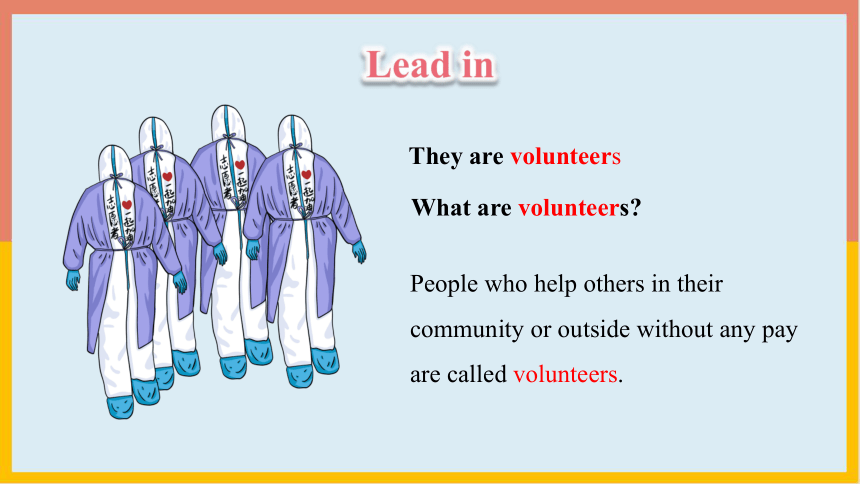
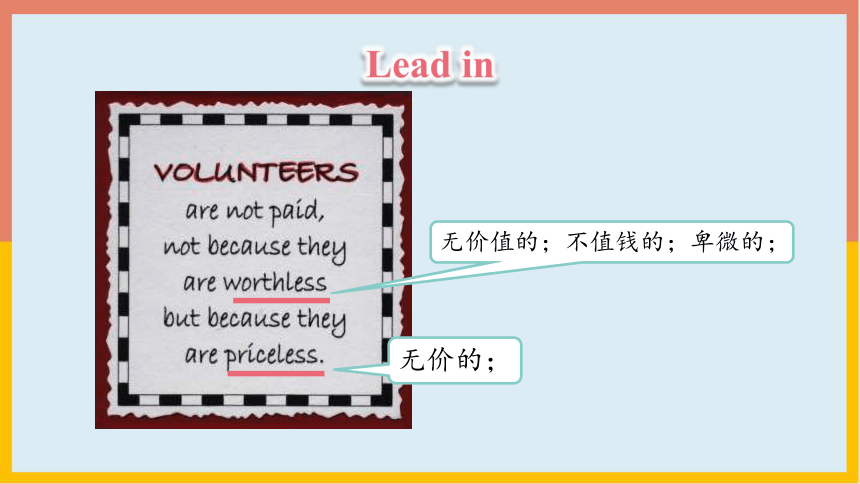

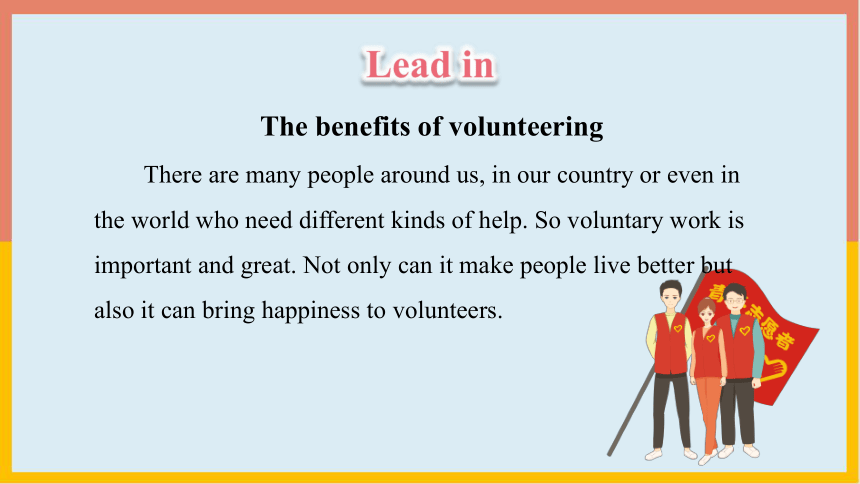


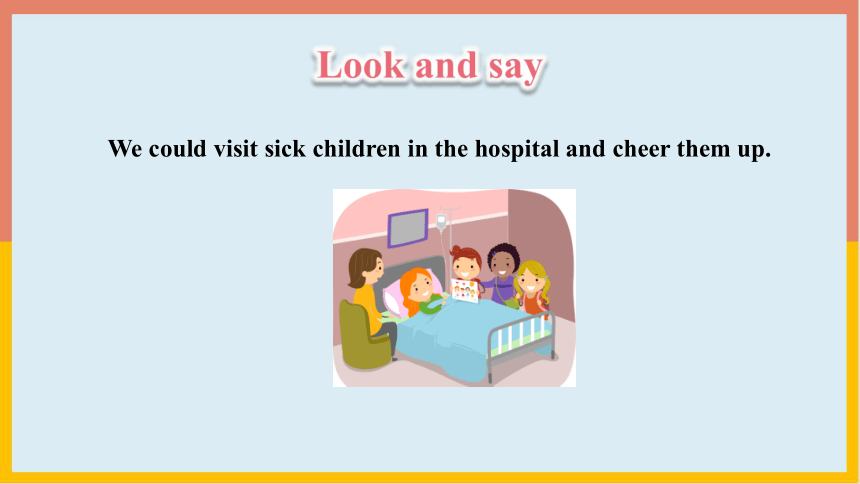

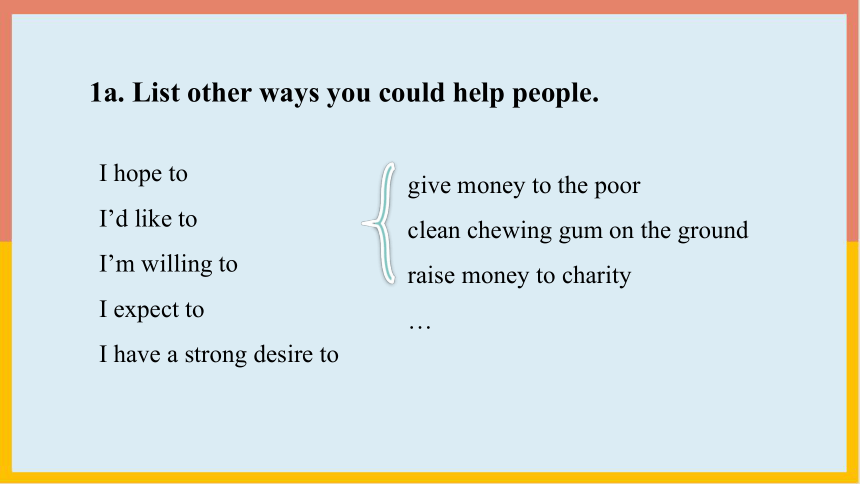

文档简介
(共47张PPT)
Unit 2 I’ll help to clean up the city parks.
Section A (1a-2d)
By the end of this period, you will be able to
1. express ways to help others in English;
2. express your intentions to be a volunteer by using “I’d like
to/I hope to/I want to” and give advice by using the modal
verb “could”;
3. make a conversation to talk about some voluntary work to
carry on volunteer spirit.
Lead in
They are volunteers
What are volunteers
People who help others in their community or outside without any pay are called volunteers.
无价值的;不值钱的;卑微的;
无价的;
Lead in
A hand means ______________.
A heart means ______________.
A dove means ______________ .
The letter v means ______________.
The letter y means______________.
help
love and care
peace
volunteer
youth
What does the sign remind you of
United Nations Volunteer in China中国青年志愿者
Lead in
The benefits of volunteering
There are many people around us, in our country or even in the world who need different kinds of help. So voluntary work is important and great. Not only can it make people live better but also it can bring happiness to volunteers.
Lead in
…
What could we do to volunteer
volunteer
help the kids
help the old
help the disabled
help improve
the environment
1a Look and say
We could visit sick children in the hospital and cheer them up.
Look and say
We could give out food at the food bank to stop hunger.
Look and say
give money to the poor
clean chewing gum on the ground
raise money to charity
…
1a. List other ways you could help people.
I hope to
I’d like to
I’m willing to
I expect to
I have a strong desire to
1b Listen and number the ways the boy and girl could help others.
The girl could visit the sick kids in the hospital to
cheer them up.
The boy could give out food at the food bank.
The girl could volunteer in an after school study
program to teach kids.
The boy could help to clean up the city parks.
3
2
4
1
Conversation 1
Boy 1: I hope to work outside.
Girl 1: You could help to clean up the city parks.
Conversation 2
Boy 2: I’d like to help homeless people.
Girl 1: You could give out food at the food bank to help feed them.
Listen and read
Conversation 3
Girl 2: I want to cheer up sick kids.
Girl 1: You could ask hospitals to let you visit the kids.
Conversation 4
Girl 1: I’d like to help kids with their schoolwork.
Girl 2: You could volunteer in an after-school study
program to teach kids.
Listen and read
1c Practice the conversation in the picture above. Then make other conversations using the information in 1b.
You could help to clean up the city parks.
I’d like to work outside.
1c Practice the conversation in the picture above. Then make other conversations using the information in 1b.
You could give out food and help feed homeless people.
I’d like to help homeless people.
1c Practice the conversation in the picture above. Then make other conversations using the information in 1b.
You could visit sick kids in the hospital.
I’d like to cheer up sick kids.
2a A group of students are planning a City Park Clean-Up Day. Listen and check( √ )the things they are going to do to tell people about it.
√
√
√
2b Listen again. Fill in the blanks.
1. We need to a plan to tell people
about the city park clean up.
2. Clean -Up Day is only two weeks from now. We can't ______
________making a plan.
3. We could signs.
4. Let's make some notices, too. Then I'll ______ them _____
after school.
5. We could each 10 students and ask them to come.
come up with
put
off
put up
hand out
call up
Boy 1: Now we need to come up with a plan to tell people about the city park clean-up.
Girl 1: Yeah, but I’m hungry, Bob. Let’s have lunch first.
Girl 2: No, we need to start now. Clean-up Day is only two weeks from now.
Boy 2: You’re right, Sally. We can’t put off making a plan.
As we talk, I’ll write down all our ideas. Then we can decide which ideas are best.
Girl 1: Um…well…we could put up signs.
Boy 2: That’s a good idea!
Girl 2: Let’s make some notices, too. Then I’ll hand them out after school.
Boy 1: OK. Great! And we could each call up 10 students and ask them to come.
Boy 2: Hey, we’re coming up with a lot of good ideas, aren’t we
Listen and read
2c Make a conversation using the information in 2a and 2b.
A: We need to come up with a plan for the City Park
Clean- Up Day.
B: Let's have lunch first.
A: No, we need to start now. Clean- Up Day is only two
weeks from now.
The old people’s home
What can we do at an old people’s home
read the newspaper to the old people
talk to/with them
let them tell their stories about the past and how things used to be
listen to them
care for them
help them clean their rooms
write to their friends or family for them
…
2d Role-play the conversation.
Helen: Hi, Tom. I'm making some plans to work in an old people's home this summer.
Tom: Really I did that last summer!
Helen: Oh, what did they ask you to help out with
Tom: Mm...things like reading the newspaper to the old people, or just talking to
them. They told me stories about the past and how things used to be.
Helen: That sounds interesting.
Tom: Yeah, a lot of old people are lonely. We should listen to them and care for them.
Helen: You're right. I mean, we're all going to be old one day, too.
2d.Read and answer the questions.
1. What is Helen going to do this summer
2. When did Tom volunteer
3. What did he do to help others
4. What is Tom’s advice
She is going to work in an old people’s home this summer.
Last summer.
He read the newspaper to the old people , talked to them and listened to their stories about the past and how things used to be.
They should listen to the old people and care for them.
clean up 打扫(或清除)干净
e.g. Chinese people clean up their houses before the Chinese New Year.
中国人在新年前打扫干净他们的房子。
We must give our classroom a good clean-up.
我们必须把教室好好打扫下。
You could help to clean up the city parks.
Language points
cheer v. 欢呼;喝彩
e.g. The beautiful song cheered her up.
那首美妙的歌曲使她高兴了起来。
Cheer up! The news isn’t too bad.
振作起来!这消息不是太坏。
The girl could visit the sick kids in the hospital to cheer them up.
Language points
give out 分发;散发
e.g. Here are some new papers. Give them out.
这儿有些新试卷。把它们发下去吧。
The flowers in my garden give out a fragrant perfume.
我花园里的花散发出芬芳的味道。
The boy could give out food at the food bank.
Language points
The girl could volunteer in an after-school study program to teach kids.
volunteer v. 义务做;自愿做n. 志愿者
Language points
e.g. He volunteered for the old people.
他自愿给这些老人服务。
He volunteers to help to clean up the city parks.
他自愿帮助打扫城市公园。
I worked as a volunteer in the park.
我在公园里当志愿者劳动。
We can’t put off making a plan.
put off 推迟;延期
e.g. We have to put off the sports meeting because of the bad weather.
因为天气不好,我们不得不推迟(举办)运动会。
Language points
Let’s make some notices, too.
notice /'n t s/ n. 通知;注意;通告v. 注意到;意识到
e.g. The notice on the wall says “No Smoking”.
墙上的布告上写着“禁止吸烟”。
Language points
We could each call up 10 students and ask them to come.
call up 打电话给(某人)
e.g. You can call me up. 你可以给我打电话。
He was called up at the beginning of the war.
战争开始时他就被征召入伍了。
Language points
They told me stories about the past and how things used to be.
used to 曾经……;过去……
Language points
used to 的各种句式:
used to的句式 肯定句 主语+used to do...
否定句 主语+used not to/usedn’t to/didn’t use to do...
疑问句 Did+ 主语+use to do... 或Used+ 主语+to do...
e.g. There used to be a cinema here.
这里曾经有个电影院。
He didn’t use /usedn’t to get up early. 他过去不早起。
—Did you use /Used you to ride a bike to school
你过去骑自行车去上学吗?
—Yes, I did/used. / No, I didn’t/usedn’t.
是的,我是。/不,我不是。
Language points
辨析:be used to doing, be used to do 与used to do
be used to doing “习惯做……”, to 是介词,后接名词、代词或动词-ing 形式。
be used to do “被用来做……”, to 为不定式符号;后接动词原形。
used to do “曾经……;过去……”, to 是不定式符号;后跟动词原形。
Language points
Yeah, a lot of old people are lonely.
lonely adj. 孤独的;寂寞的
e.g. He always feels lonely and wants to have a friend to talk to.
他总是感到孤独,想有个说话的朋友。
Language points
lonely 形容词 孤独的;寂寞的 强调主观感情,心灵上的孤独,具有伤感色彩
alone 形容词 单独的;独自的 强调客观情况,数量上就一个。
副词 单独;独自
【辨析】lonely与alone
Language points
e.g. During that time, the girl had to stay at home alone.
在那期间,这个女孩不得不独自在家里。
They lived in a lonely village.
他们居住在一个荒凉的村庄。
Language points
We should listen to them and care for them.
care for 照顾;非常喜欢
e.g. Mrs.Wang is caring for her baby.
王女士正在照顾她的孩子。
Li Ming doesn’t care for meat.
李明不喜欢肉类。
Language points
一、根据首字母或汉语提示用适当的词或词组完成句子
1. Now more and more young teachers v to teach in
the countryside.
2. Look at the n on the board. It says, “There's a fashion
show in our school next week.”
3. The s means that cars cannot enter.
olunteer
otice
ign
4. The teacher often sings songs to ___________(使振奋起来)
his students in class.
5. Many volunteers will help to ____________ (打扫干净)
the city parks next Friday.
cheer up
clean up
二、单项选择
1. The old woman lives in the small village ________. But she doesn't feel ________.
A. alone; alone B. alone; lonely
C. lonely; alone D. lonely; lonely
2. We have to ______ the bike ride because of the bad weather.
A. put off B. turn off C. take off D. get off
B
A
3.—Do you think it is popular to ______ red envelopes on We Chat during festivals
—Yes. But I prefer giving gifts to family members.
A. give out B. give away C. give back D. give up
4. Many students ________ the old and they often volunteer in the old people's home.
A. look for B. listen to C. depend on D. care for
A
D
5. The government of China________ the idea of A Belt and A Road in 2013.
A. came up with B. made up with C. cheered up D. put up
A
1)掌握这些短语动词的构成和用法:
clean up, city, cheer, cheer up, give out, volunteer, notice, used to, lonely
2) 学会提供帮助的基本句型:
I’d like to work outside.
I’ll help clean the city park.
You could give out food at a food bank.
1.Write three conversations about your discussions with your classmates.
A: I’d like to help the old. What could I do
B: You could give them medical service.
2. Preview Unit 2-Section A(3a-3c).
Bye Bye!
Unit 2 I’ll help to clean up the city parks.
Section A (1a-2d)
By the end of this period, you will be able to
1. express ways to help others in English;
2. express your intentions to be a volunteer by using “I’d like
to/I hope to/I want to” and give advice by using the modal
verb “could”;
3. make a conversation to talk about some voluntary work to
carry on volunteer spirit.
Lead in
They are volunteers
What are volunteers
People who help others in their community or outside without any pay are called volunteers.
无价值的;不值钱的;卑微的;
无价的;
Lead in
A hand means ______________.
A heart means ______________.
A dove means ______________ .
The letter v means ______________.
The letter y means______________.
help
love and care
peace
volunteer
youth
What does the sign remind you of
United Nations Volunteer in China中国青年志愿者
Lead in
The benefits of volunteering
There are many people around us, in our country or even in the world who need different kinds of help. So voluntary work is important and great. Not only can it make people live better but also it can bring happiness to volunteers.
Lead in
…
What could we do to volunteer
volunteer
help the kids
help the old
help the disabled
help improve
the environment
1a Look and say
We could visit sick children in the hospital and cheer them up.
Look and say
We could give out food at the food bank to stop hunger.
Look and say
give money to the poor
clean chewing gum on the ground
raise money to charity
…
1a. List other ways you could help people.
I hope to
I’d like to
I’m willing to
I expect to
I have a strong desire to
1b Listen and number the ways the boy and girl could help others.
The girl could visit the sick kids in the hospital to
cheer them up.
The boy could give out food at the food bank.
The girl could volunteer in an after school study
program to teach kids.
The boy could help to clean up the city parks.
3
2
4
1
Conversation 1
Boy 1: I hope to work outside.
Girl 1: You could help to clean up the city parks.
Conversation 2
Boy 2: I’d like to help homeless people.
Girl 1: You could give out food at the food bank to help feed them.
Listen and read
Conversation 3
Girl 2: I want to cheer up sick kids.
Girl 1: You could ask hospitals to let you visit the kids.
Conversation 4
Girl 1: I’d like to help kids with their schoolwork.
Girl 2: You could volunteer in an after-school study
program to teach kids.
Listen and read
1c Practice the conversation in the picture above. Then make other conversations using the information in 1b.
You could help to clean up the city parks.
I’d like to work outside.
1c Practice the conversation in the picture above. Then make other conversations using the information in 1b.
You could give out food and help feed homeless people.
I’d like to help homeless people.
1c Practice the conversation in the picture above. Then make other conversations using the information in 1b.
You could visit sick kids in the hospital.
I’d like to cheer up sick kids.
2a A group of students are planning a City Park Clean-Up Day. Listen and check( √ )the things they are going to do to tell people about it.
√
√
√
2b Listen again. Fill in the blanks.
1. We need to a plan to tell people
about the city park clean up.
2. Clean -Up Day is only two weeks from now. We can't ______
________making a plan.
3. We could signs.
4. Let's make some notices, too. Then I'll ______ them _____
after school.
5. We could each 10 students and ask them to come.
come up with
put
off
put up
hand out
call up
Boy 1: Now we need to come up with a plan to tell people about the city park clean-up.
Girl 1: Yeah, but I’m hungry, Bob. Let’s have lunch first.
Girl 2: No, we need to start now. Clean-up Day is only two weeks from now.
Boy 2: You’re right, Sally. We can’t put off making a plan.
As we talk, I’ll write down all our ideas. Then we can decide which ideas are best.
Girl 1: Um…well…we could put up signs.
Boy 2: That’s a good idea!
Girl 2: Let’s make some notices, too. Then I’ll hand them out after school.
Boy 1: OK. Great! And we could each call up 10 students and ask them to come.
Boy 2: Hey, we’re coming up with a lot of good ideas, aren’t we
Listen and read
2c Make a conversation using the information in 2a and 2b.
A: We need to come up with a plan for the City Park
Clean- Up Day.
B: Let's have lunch first.
A: No, we need to start now. Clean- Up Day is only two
weeks from now.
The old people’s home
What can we do at an old people’s home
read the newspaper to the old people
talk to/with them
let them tell their stories about the past and how things used to be
listen to them
care for them
help them clean their rooms
write to their friends or family for them
…
2d Role-play the conversation.
Helen: Hi, Tom. I'm making some plans to work in an old people's home this summer.
Tom: Really I did that last summer!
Helen: Oh, what did they ask you to help out with
Tom: Mm...things like reading the newspaper to the old people, or just talking to
them. They told me stories about the past and how things used to be.
Helen: That sounds interesting.
Tom: Yeah, a lot of old people are lonely. We should listen to them and care for them.
Helen: You're right. I mean, we're all going to be old one day, too.
2d.Read and answer the questions.
1. What is Helen going to do this summer
2. When did Tom volunteer
3. What did he do to help others
4. What is Tom’s advice
She is going to work in an old people’s home this summer.
Last summer.
He read the newspaper to the old people , talked to them and listened to their stories about the past and how things used to be.
They should listen to the old people and care for them.
clean up 打扫(或清除)干净
e.g. Chinese people clean up their houses before the Chinese New Year.
中国人在新年前打扫干净他们的房子。
We must give our classroom a good clean-up.
我们必须把教室好好打扫下。
You could help to clean up the city parks.
Language points
cheer v. 欢呼;喝彩
e.g. The beautiful song cheered her up.
那首美妙的歌曲使她高兴了起来。
Cheer up! The news isn’t too bad.
振作起来!这消息不是太坏。
The girl could visit the sick kids in the hospital to cheer them up.
Language points
give out 分发;散发
e.g. Here are some new papers. Give them out.
这儿有些新试卷。把它们发下去吧。
The flowers in my garden give out a fragrant perfume.
我花园里的花散发出芬芳的味道。
The boy could give out food at the food bank.
Language points
The girl could volunteer in an after-school study program to teach kids.
volunteer v. 义务做;自愿做n. 志愿者
Language points
e.g. He volunteered for the old people.
他自愿给这些老人服务。
He volunteers to help to clean up the city parks.
他自愿帮助打扫城市公园。
I worked as a volunteer in the park.
我在公园里当志愿者劳动。
We can’t put off making a plan.
put off 推迟;延期
e.g. We have to put off the sports meeting because of the bad weather.
因为天气不好,我们不得不推迟(举办)运动会。
Language points
Let’s make some notices, too.
notice /'n t s/ n. 通知;注意;通告v. 注意到;意识到
e.g. The notice on the wall says “No Smoking”.
墙上的布告上写着“禁止吸烟”。
Language points
We could each call up 10 students and ask them to come.
call up 打电话给(某人)
e.g. You can call me up. 你可以给我打电话。
He was called up at the beginning of the war.
战争开始时他就被征召入伍了。
Language points
They told me stories about the past and how things used to be.
used to 曾经……;过去……
Language points
used to 的各种句式:
used to的句式 肯定句 主语+used to do...
否定句 主语+used not to/usedn’t to/didn’t use to do...
疑问句 Did+ 主语+use to do... 或Used+ 主语+to do...
e.g. There used to be a cinema here.
这里曾经有个电影院。
He didn’t use /usedn’t to get up early. 他过去不早起。
—Did you use /Used you to ride a bike to school
你过去骑自行车去上学吗?
—Yes, I did/used. / No, I didn’t/usedn’t.
是的,我是。/不,我不是。
Language points
辨析:be used to doing, be used to do 与used to do
be used to doing “习惯做……”, to 是介词,后接名词、代词或动词-ing 形式。
be used to do “被用来做……”, to 为不定式符号;后接动词原形。
used to do “曾经……;过去……”, to 是不定式符号;后跟动词原形。
Language points
Yeah, a lot of old people are lonely.
lonely adj. 孤独的;寂寞的
e.g. He always feels lonely and wants to have a friend to talk to.
他总是感到孤独,想有个说话的朋友。
Language points
lonely 形容词 孤独的;寂寞的 强调主观感情,心灵上的孤独,具有伤感色彩
alone 形容词 单独的;独自的 强调客观情况,数量上就一个。
副词 单独;独自
【辨析】lonely与alone
Language points
e.g. During that time, the girl had to stay at home alone.
在那期间,这个女孩不得不独自在家里。
They lived in a lonely village.
他们居住在一个荒凉的村庄。
Language points
We should listen to them and care for them.
care for 照顾;非常喜欢
e.g. Mrs.Wang is caring for her baby.
王女士正在照顾她的孩子。
Li Ming doesn’t care for meat.
李明不喜欢肉类。
Language points
一、根据首字母或汉语提示用适当的词或词组完成句子
1. Now more and more young teachers v to teach in
the countryside.
2. Look at the n on the board. It says, “There's a fashion
show in our school next week.”
3. The s means that cars cannot enter.
olunteer
otice
ign
4. The teacher often sings songs to ___________(使振奋起来)
his students in class.
5. Many volunteers will help to ____________ (打扫干净)
the city parks next Friday.
cheer up
clean up
二、单项选择
1. The old woman lives in the small village ________. But she doesn't feel ________.
A. alone; alone B. alone; lonely
C. lonely; alone D. lonely; lonely
2. We have to ______ the bike ride because of the bad weather.
A. put off B. turn off C. take off D. get off
B
A
3.—Do you think it is popular to ______ red envelopes on We Chat during festivals
—Yes. But I prefer giving gifts to family members.
A. give out B. give away C. give back D. give up
4. Many students ________ the old and they often volunteer in the old people's home.
A. look for B. listen to C. depend on D. care for
A
D
5. The government of China________ the idea of A Belt and A Road in 2013.
A. came up with B. made up with C. cheered up D. put up
A
1)掌握这些短语动词的构成和用法:
clean up, city, cheer, cheer up, give out, volunteer, notice, used to, lonely
2) 学会提供帮助的基本句型:
I’d like to work outside.
I’ll help clean the city park.
You could give out food at a food bank.
1.Write three conversations about your discussions with your classmates.
A: I’d like to help the old. What could I do
B: You could give them medical service.
2. Preview Unit 2-Section A(3a-3c).
Bye Bye!
同课章节目录
- Unit 1 What's the matter?
- Section A
- Section B
- Unit 2 I'll help to clean up the city parks.
- Section A
- Section B
- Unit 3 Could you please clean your room?
- Section A
- Section B
- Unit 4 Why don't you talk to your parents?
- Section A
- Section B
- Unit 5 What were you doing when the rainstorm came
- Section A
- Section B
- Review of Units 1-5
- Unit 6 An old man tried to move the mountains.
- Section A
- Section B
- Unit 7 What's the highest mountain in the world?
- Section A
- Section B
- Unit 8 Have you read Treasure Island yet?
- Section A
- Section B
- Unit 9 Have you ever been to a museum?
- Section A
- Section B
- Unit 10 I've had this bike for three years.
- Section A
- Section B
